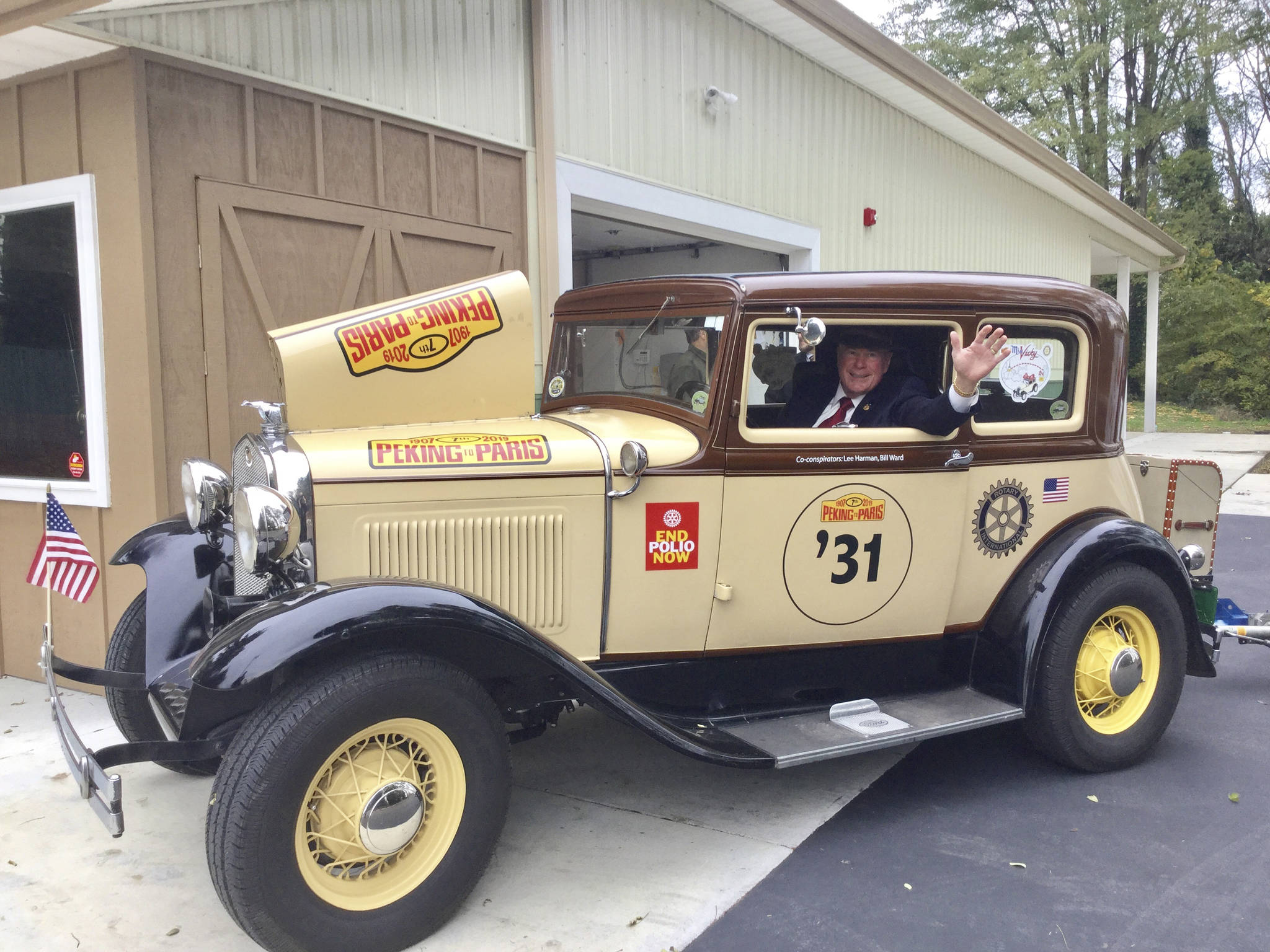ARLINGTON – Retired Arlington physician Lee Harman would travel around the world to see polio wiped out in our lifetime – and that’s halfway what he aims to do.
The longtime Rotary Club member, joined by his travel chum, retired Army Mjr. Bill Ward, will set course on a once-in-a-lifetime amazing race, the 7th Peking to Paris Endurance Motor Challenge. “We’re dedicating our 10,000-mile expedition to bring awareness to the public about Rotary’s grandest achievement – the eradication of polio in the world,” said Harman, who serves as PolioPlus chairman for District 5050 that extends from Everett to past the Candian border. The duo will make the journey in “Miss Vicky,” a 1938 Model A Ford Victoria, entered in the vintage car category, covering the race in 36 days. That’s 400 grueling miles a day.
Harman is already putting miles on Miss Vicky, visiting Rotary clubs and other speaking venues. Last week he dropped in at the Marysville Noon Rotary at a location where his stylish Miss Vicky looked right at home: the Marysville Historical Museum.
“We’re going to be going places where there are roads, poorly maintained stretches and no roads, and strange rivers to cross where there are no bridges,” Harman said. “We’re going to be camping for a week in the Gobi Desert. “This is really the granddaddy of all endurance motor vehicle runs.”
The next Peking (Beijing) to Paris Rally, held every three years with the next set for summer 2019, is said to be one of the toughest vintage car races in the world, extending roughly along a straight line to Moscow, then into Scandinavia before dropping south into France.
Harman said the perils and tribulations that he and Ward will face will be all worthwhile to call attention to the importance of eradicating polio once and for all, while meeting a goal to raise $1 million in their endeavor.
But the travails that await them are nothing compared to the pain and suffering that polio has wrought, mostly targeting humankind’s most vulnerable.
Polio is a highly infectious disease that most-commonly affects kids under 5. The virus is spread person to person, usually through contaminated water or playing in virus-rich dirt in places with poor sanitation. Untreated, polio can attack the nervous system, and worse, lead to paralysis and death.
“It’s an ancient, crippling, childhood disease,” Harman said. “It’s worldwide, it’s preventable, and it’s still around.”
From 1900-1956, 500,000 polio cases were reported worldwide, with 50,000 deaths per year in the U.S. from 1948-56. Treatment included the now-obsolete “iron lung” chamber that helped stricken patients breathe normally.
Rotary’s name has become synonymous with polio eradication since 1982. “Polio eradication is Rotary’s best kept secret, and it’s time to let it out,” Harman said.
At the time, Rotary International leadership approached the U.S. Centers for Disease Control and said “we want to do something special. We want to knock something down; what can we do?” Harman said. CDC officials said human ingenuity had already proved that elimination of an entire disease was doable, such as with smallpox.
Rotary raised $120 million over three years in the early ’80s, helping inoculate 160 million kids at 650,000 vaccination booth, said Harman. His own involvement in PolioPlus has taken him to India to work with teams from CDC, the World Health Organization and UNICEF, entering off-the-grid villages to inoculate children. He saw firsthand how lives can improve. The joint efforts led to the start of National Immunization Days with the goal of inoculating children worldwide, and the results are astounding.
In 1984, there were 125 endemic nations and 350,000 people per year contracted the disease. Today, only three countries – Nigeria, Pakistan and Afghanistan – had reported cases, 76 total, including 13 of wild polio virus. India, where Harman visited, has been polio-free for seven years.
“This may be the last years that the polio virus is found on Earth, and it will be because of Rotary,” Harman said. “We’re close. The drop to zero is coming.”
However, Harman added that while medical advances, more “boots on the ground” and GPS mapping are better enabling teams to reach more neighborhoods, villages and out-of-the-way places, this is no time for complacency.
“Kids are still being born, and they’re not protected,” Harman said. Now, he said, “We’re trying to energize people outside Rotary to give money to the PolioPlus program,” and bring everyone else along for the ride by donating to the cause.
For every $1 the public donates, the Bill and Melinda Gates Foundation will contribute $2, with the goal overall to raise $1.2 billion internationally. On the PolioPlus website, Bill Gates was quoted explaining the relationship with Rotary in his global foundation’s efforts toward quality healthcare and education endeavors worldwide: “Every where I go to learn about polio, I see Rotary members helping out with the hard work. I feel sure that with continued support, we will be able to show significant progress.”
Just a penny per mile donation would amount to $100, all tax-deductible, with no proceeds going toward costs related to race participation. To donate or learn more, visit the Miss Vicky website at www.missvicky4polioplus.com.



